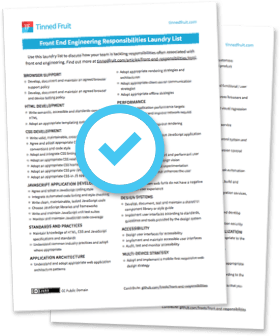Dealing with negative product feedback
When I first made the jump to working on a consumer product, a big thing that surprised me was the feedback from users.
Most of it was generally favourable, and sometimes ecstatic. But sometimes we’d get really negative feedback about specific parts of the product that would make it past the protective layer of the customer support team and into the engineering team.
As I contributed more to the product, this really negative feedback sometimes felt like it was directed at me personally. I never became completely immune to it, but I did at least become better at dealing with it.
So, here are a few things to think about when this happens to you.
1. Are they stating an opinion or a fact?
Any feedback that you can’t use is not worth worrying about. There’s a big difference between someone saying ‘
In either case, if you can, dig in to opinions to get to something as concrete as possible. Unfortunately, this is not always possible. Some users will just vote with their feet and leave. Some will open a customer support ticket which just contains abuse and not respond to follow ups.
As you probably don’t have too many customer service responsibilities, it is important that those that do are digging into complaints and tickets with as much detail and background as they can. You want to hear about issues from your support team, but you don’t want to hear about every single complaint.
You should only act on facts that can be reproduced. This might mean a usability study, some digging into production logs, looking at monitoring dashboards or working through an issue on a call with a user yourself.
2. Avoid defensiveness. Take responsibility.
It’s all too easy to fall into a defensive mindset. We naturally want any problem to be someone else’s responsibility. But it’s far healthier to assume that any real issue is your responsibility until proven otherwise.
Even the most irrationally incensed user complaint can be caused by a real system problem. Being defensive will hinder your chances of tracking it down, because you’re looking for a way out rather than a solution.
Involve other people when it’s clear that they need to be involved. But don’t pass the buck.
3. How important and urgent is this?
Just because a user complains loudly doesn’t mean you should drop everything and help them.
Customer support agents can’t always tell how serious a complaint is, and so they will ask for assistance.
If there’s a big surge in complaints about ‘slowness’, is it because those people all happen to be commuting just then and have spotty connections? Or is it because one of your team just added a third party library that’s affecting performance?
Triaging is important, but as soon as you decide that an issue is not that important or urgent, it should be put into a backlog somewhere so that you aren’t reactive to every little customer support issue that arises.
What other tips do you have for dealing with negative customer feedback?
All the best,
– Jim
